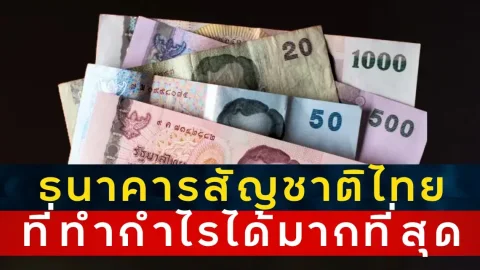Crash because the management plays stocks.
Trying to avoid a "catastrophe" is one of the most important things in long-term investing.
Recently, almost all groups of individual investors, including VI retail and large "expert" investors, have been "hurting". Some of them are almost "catastrophic". Having a portfolio "losing 50%" or more is no longer "unusual". Although the SET index did not fall very severely at a critical level, and it did not fall quickly because some serious events occurred. In fact, the stock market has been "very lonely" lately. The daily volume of stock trading decreased to only about 40,000-50,000 million baht per day. On average, the stock index fluctuates little, but it gradually declines slowly, which some analysts say is a "frog boil" symptom, which is that the stock index declines slowly until people don't realize it. Before you know, it's too late.
Investors who hurt so much in this round, as mentioned, are because they play stocks or invest in small and medium-sized companies that have previously performed greatly. The stock price has risen so strongly and incredibly high because the stock is "cornered" because the amount of money from the people who buy it is much higher than usual and it usually comes from large investors who invest in stocks with stories and outstanding performance. But what seems to be the decisive and necessary factor is that the owners and executives of those companies also participate in their own "stock play".
The stock price that used to rise many times in several years has fallen steadily, some of which have fallen to 7-80% even though some stocks have not had serious business events. While there are very few buyers
The important lesson I will talk about today is that stocks that are "ruined" or collapsed during this period often have one thing in common: they are stocks that owners and executives "play their own shares", that is, they may directly enter the trade and persuade people to play their stocks by providing information that is too good to be true. Revise and adjust quarterly earnings figures. Conducting projects and/or buying other businesses both on and off the stock exchange to increase the company's growth estimates. They bought and held a large number of their shares in order to confirm to other investors that their shares were "really good". Let's take a look at the details one by one
What says that executives "play stocks" themselves is that executives are already the largest shareholders. The money used to buy them comes from loans by pawning shares or placing them as collateral in a margin stock trading account.
This is something extraordinary. Because if you think that a good company grows fast and stocks are cheap. In the future, your own wealth must be very high. The need to increase investment by 5-10% is minimal. What may be more realistic is that executives borrow money to push up prices or participate in the stock corner.
Pushing the stock price of executives In addition to directly increasing the buying power of stocks. The management buys and must immediately disclose it to the public. The more you buy and continue to buy, the more confidence you will build, making the demand for stocks in the market higher than the number of people who want to sell
At some point, the stock is cornered. The stock price went up to the extreme and was much higher than the fundamentals it should be. This makes executives or owners become millionaires of thousands or tens of thousands or hundreds of billions of baht. And that's what actually happened at a certain time.
But when the corner "breaks", Before the management and owners "exited" and were forced to sell, a disaster occurred, and of course, not only the owners, but all investors who participated in playing or investing in stocks were affected all over the place. The stock portfolio was unexpectedly heavily damaged. Long-term investment returns that used to be good or very good Significant decrease. Many of them may even be below the market average.
The next thing is that executives often come out and talk about boasting about the company's capabilities. Growth of both existing and new businesses to be done, or more importantly, the purchase of shares and/or other companies. Simply put, he is the master of the "project". The reason for each deal sounds great and will make future earnings grow even more.
But over time, you will find that there are almost no good activities or companies as expected, and that may be because the management does all the things to create a picture of growth for the company so that the stock price can run up.
The next point is that the stocks that have fallen very heavily this time around often use "financial engineering" quite a lot. Examples include capital increase to other parties in the form of PP, the sale of a significant portion of shares from the owner to a strategic partner or major investor. The issuance of derivative instruments such as warrants to a large number of shareholders, etc
Companies that do this often without a clear good reason In fact, it may be a "stock strategy" that is done in order to increase the value of the stock. "Broken" Because the people who buy PP shares are usually not partners, but stock players who hope for quick profits. Drag stocks up and sell more quickly.
Many of the stocks that have fallen very heavily this time have been or may still be stocks of good or very good quality before. However, during the period when the stock went up, the price exceeded the fundamentals by a lot. The main reason is that stocks are cornered a lot. The PE value is very high, some of which are up to 40-50 times or more from the "normal profit", which is more suitable for "global technology companies" than ordinary Thai companies that happen to be good at favorable times for the industry
Good" stocks that have fallen very heavily recently must have a "brand" or be "certified" by a "stock expert" who is recognized in the stock market. Therefore, it is found that in addition to executives and stock owners who buy and sell shares to invest in their own companies. The company usually has a "stock expert" as a "major shareholder", that is, holding a majority stake as one of the top 10 of the company, or during this period, holding at least 0.5% of the company's total shares
It is possible that the "expert" really invested on the basis and according to the "VI" principle and was not personally related or known to the management, but in many cases, it seems that the expert is close to the management and has activities together in many matters, and of course it may be the person who draws the expert to "play with his own stock". This makes everyone, especially those who play stocks or invest according to experts. "Seriously hurt" as well
The fall of stocks that used to be "angel stocks" of both large and small individual investors, both speculators and "VI" in this round, for many people, is considered to be much more severe than the fall during economic and financial crises such as the subprime crisis in 2008 because the rate of loss is also high at the level of 40-50% of the portfolio
But what hurts more than during the economic crisis and the stock market is that many investors think that they have been "tricked" into playing or "cheated". And in the case of "VI" investors, or those who analyze stocks in a fundamental way that has suffered a lot of damage. Each person's pain may be different, but one thing I believe will happen to people who have been around for a long time and "have been". If you succeed from high investment, you will probably lose a lot of confidence in investment, and you will remember one of the most important lessons:
In the short term, maybe as long as 10 years, you may make excellent investment returns by tens of percent per year compoundly, surpassing even Warren Buffett, but in the long term for 20 years or more. Compound returns will run towards it. An irresistible "restriction", such as a "catastrophe" that destroys the once excellent returns, returns to reality at about 10% per annum compounded. Long-term excellent returns often come with risks that you "can't imagine" and will happen one day.
For me, Trying to avoid a "catastrophe" is one of the most important things in a long-term investment. Try to think or study to know where we will "die?" So that we don't go there. That's a classic Charlie quote. Monkey One of the most important "dead" points that I think is to take out a loan to buy stocks with a large margin that we should not go to no matter how good we think the stock is.
 ทำไมคุณไม่ควรใส่เกลือ เมื่อเริ่มเคี่ยวกระดูก?
ทำไมคุณไม่ควรใส่เกลือ เมื่อเริ่มเคี่ยวกระดูก? ยกเลิกข้อความไม่ได้ไม่ใช่เครื่องพัง แต่เพราะ “หมดเวลา” ไขข้อสงสัย LINE ปี 2569 ที่คนใช้ไลน์ทุกคนควรรู้
ยกเลิกข้อความไม่ได้ไม่ใช่เครื่องพัง แต่เพราะ “หมดเวลา” ไขข้อสงสัย LINE ปี 2569 ที่คนใช้ไลน์ทุกคนควรรู้ อำเภอที่อยู่ไกลจากตัวจังหวัดที่สุด
อำเภอที่อยู่ไกลจากตัวจังหวัดที่สุด ประเทศที่มีแหล่งน้ำมันดิบ ปริมาณมากที่สุดเป็นอันดับหนึ่งของโลก
ประเทศที่มีแหล่งน้ำมันดิบ ปริมาณมากที่สุดเป็นอันดับหนึ่งของโลก จข.ร้านยอมรับ "เจ็บ..แต่จบ" เมื่อรู้ว่าขายน้ำสมุนไพรจีน ผิดกฏหมาย
จข.ร้านยอมรับ "เจ็บ..แต่จบ" เมื่อรู้ว่าขายน้ำสมุนไพรจีน ผิดกฏหมาย "โรม" งง! เตือนคนไทยอย่าหลงกล "ฮุนเซน"..หลัง รมต.เขมร แทรกแซงการเมืองไทย
"โรม" งง! เตือนคนไทยอย่าหลงกล "ฮุนเซน"..หลัง รมต.เขมร แทรกแซงการเมืองไทย จังหวัดเดียวในประเทศไทย ที่ทุกอำเภออยู่ติดฝั่งทะเลและชายแดน
จังหวัดเดียวในประเทศไทย ที่ทุกอำเภออยู่ติดฝั่งทะเลและชายแดน เมืองโบราณลึกลับในตำนาน ที่อยู่ในเขตพื้นที่ของประเทศกัมพูชา
เมืองโบราณลึกลับในตำนาน ที่อยู่ในเขตพื้นที่ของประเทศกัมพูชา ธนาคารสัญชาติไทย ที่ทำกำไรได้มากที่สุดเป็นอันดับหนึ่ง
ธนาคารสัญชาติไทย ที่ทำกำไรได้มากที่สุดเป็นอันดับหนึ่ง หลังจากใช้ชีวิตอยู่ในถ้ำ นักธรณีวิทยาก็ได้ค้นพบสาขาชีววิทยาใหม่โดยไม่ตั้งใจ
หลังจากใช้ชีวิตอยู่ในถ้ำ นักธรณีวิทยาก็ได้ค้นพบสาขาชีววิทยาใหม่โดยไม่ตั้งใจ ทรัมป์ประกาศเก็บภาษี 25% ต่อประเทศที่ค้าขายกับอิหร่าน
ทรัมป์ประกาศเก็บภาษี 25% ต่อประเทศที่ค้าขายกับอิหร่าน บทพิสูจน์นักรบแห่งอเมซอน พิธีกรรมมดกระสุน ความเจ็บปวดที่โลกต้องจารึก
บทพิสูจน์นักรบแห่งอเมซอน พิธีกรรมมดกระสุน ความเจ็บปวดที่โลกต้องจารึก อาหารหากินง่าย ช่วยบำรุงหัวใจ ช่วยลดไขมันในเลือด ลดระดับคอเลสเตอรอล ความดันโลหิต
อาหารหากินง่าย ช่วยบำรุงหัวใจ ช่วยลดไขมันในเลือด ลดระดับคอเลสเตอรอล ความดันโลหิต ทรัมป์ประกาศเก็บภาษี 25% ต่อประเทศที่ค้าขายกับอิหร่าน
ทรัมป์ประกาศเก็บภาษี 25% ต่อประเทศที่ค้าขายกับอิหร่าน โปรดระมัดระวังเมื่อเดินทางไปญี่ปุ่น! "จำนวนผู้ป่วยโรคที่เกิดจากเห็บพุ่งสูงเป็นประวัติการณ์" โดยกรณีร้ายแรงอาจถึงแก่ชีวิตได้
โปรดระมัดระวังเมื่อเดินทางไปญี่ปุ่น! "จำนวนผู้ป่วยโรคที่เกิดจากเห็บพุ่งสูงเป็นประวัติการณ์" โดยกรณีร้ายแรงอาจถึงแก่ชีวิตได้ สนามบินที่มีขนาดเล็กที่สุด ที่ยังคงเปิดให้บริการอยู่จริงบนโลก
สนามบินที่มีขนาดเล็กที่สุด ที่ยังคงเปิดให้บริการอยู่จริงบนโลก






